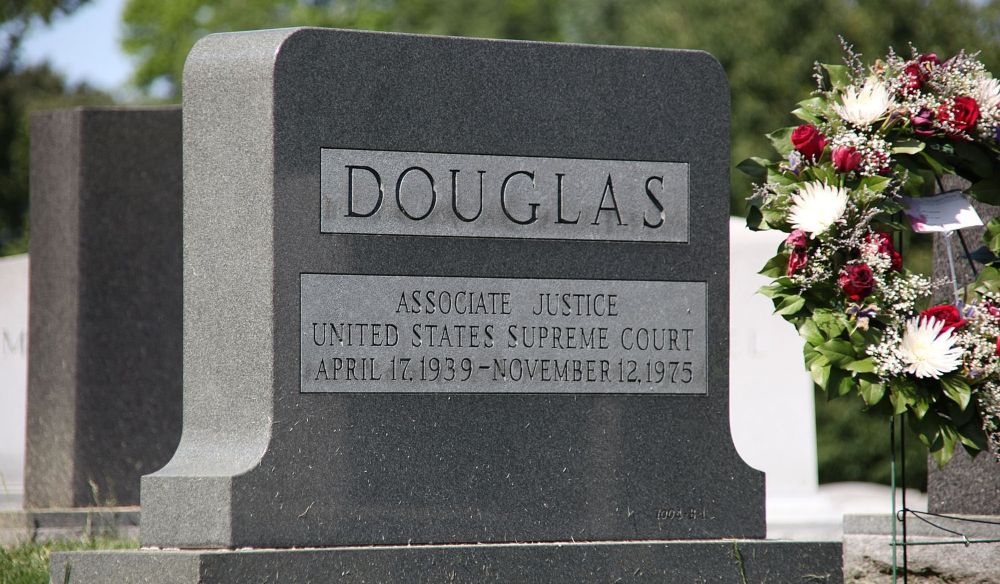Washington State’s own William Orville Douglas had interests that were clear and precise by the time he was 50. Among those interests was an abiding, unbending belief in the United States of America as a citadel of human freedom. The underlying reason for that circumstance, Douglas wrote in the 1970s, was “The First Amendment . . . (which) seemed to me to be the most important guarantee of freedom that we had.” The state, Douglas said, existed for the individual, not the reverse.
Douglas was raised in Yakima, Washington in a five-room house on the “wrong” side of the tracks. He and his younger brother Arthur picked and packed fruit alongside the sons of other poor families. Douglas hiked the nearby hills to strengthen his “pipestem” legs which had been weakened by a childhood bout of infantile paralysis. During high school he delivered the Yakima Morning Herald and Daily Republic on weekdays and the Seattle Post-Intelligencer on Sundays. Later, he set pins in a bowling alley, ran errands in an ice cream plant, and became involved in a local minister’s effort to promote Prohibition and “reform” Yakima’s red light district on South Front Street.
Looking back on those hard, blue-collar days, Douglas expressed sympathy for the “miserable people” he had known. In his autobiography, Go East, Young Man, he wrote that “South Front Street in Yakima made me realize that there were those even in this free land who thought that some men were more equal than others.” During his college summers, while working the wheat harvest, the future U.S. Supreme Court Justice enjoyed listening to the tales of Wobblies, the Industrial Workers of the World, who were considered criminals by many of his neighbors.
After Whitman College and Columbia Law School, which Douglas first reached by delivering two thousand sheep to Chicago aboard freight trains, these gritty experiences also had influence on the young Whitman student. His dean at Columbia was the future U.S. Supreme Court Justice Harlan F. Stone. The six years Douglas spent in New York City were a mixed blessing. Douglas recalled the “open-faced” and friendly people he met at the inexpensive Horn & Hardart Restaurants. He also remembered being rebuffed by well-dressed Park Avenue pedestrians when he asked directions.
As a member of the U.S. Supreme Court, to which he was appointed by FDR in 1939 at the age of 41 (the youngest in 128 years), Justice Douglas found support for the First Amendment from a senior colleague, Justice Hugo L. Black. Later the Earl Warren Court, with the active participation of William O. Douglas, generally stood fast for First Amendment rights. That included a ruling in 1957 that congressional investigating committees were restrained from certain intrusive practices by the First Amendment.
Douglas learned that defending the First Amendment could be a precarious undertaking. From Douglas’ point of view, the First Amendment was inviolate and clear, which meant that occasionally an unpleasant or unpopular character found protection within its clauses. As an example, Douglas wrote that “communists . . . should have the right to speak, for the First Amendment covers the entire spectrum of ideas. To select the ‘good’ from the ‘bad,’ to sift out First Amendment garbage would amount to government censorship. And that circumstance is what Jefferson and Madison feared.”
The over 40 books Justice Douglas wrote are liberally salted with his firm views on First Amendment rights. His articles and addresses are weighted with admonition, homily, and examples supporting the core value of human freedom.
Douglas wrote: “In the oscillating movement of the planets man is a tiny speck – a microcosm. We seek truth, and in that search, a medley of voices is essential. That is why the First Amendment is our most precious inheritance. It gives equal time to my opponents, as it gives to me.”
Discover more from Post Alley
Subscribe to get the latest posts sent to your email.

Very enjoyable and timely article.
Thanks. I forwarded this to Jerry Falk, a law school classmate of mine, who clerked for him.